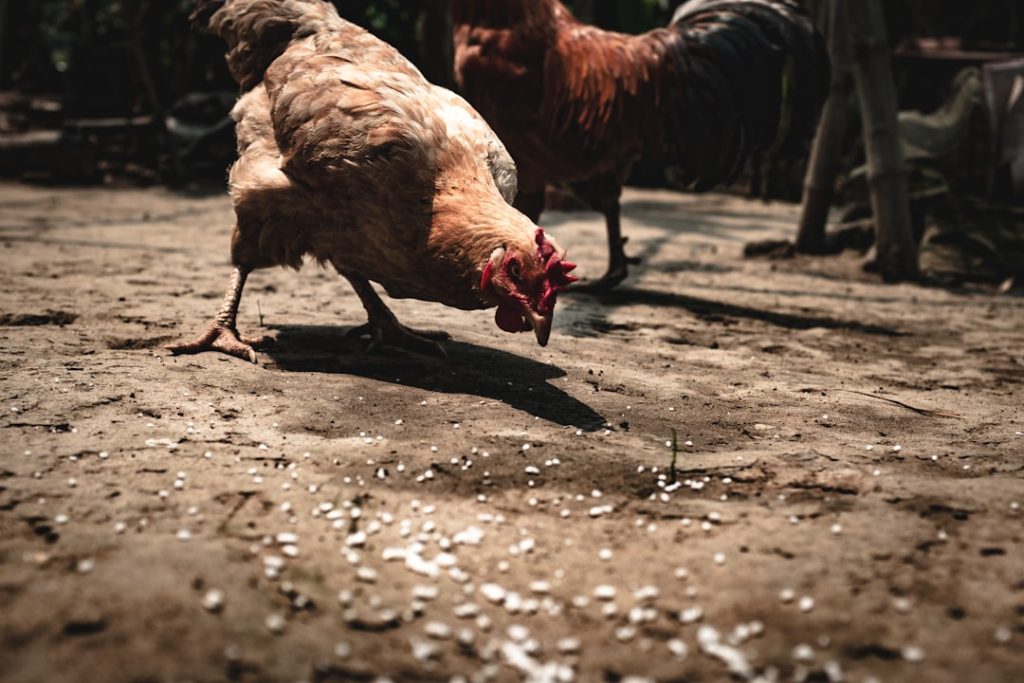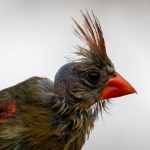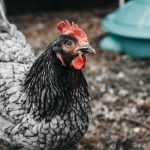Proper nutrition is crucial for maintaining the health and well-being of chickens. A balanced diet provides essential nutrients for growth, egg production, and overall health. High-quality commercial chicken feed serves as a solid foundation, containing appropriate ratios of protein, carbohydrates, fats, vitamins, and minerals.
Supplementing this diet with occasional treats like fruits, vegetables, and grains can be beneficial, but these should not exceed 10% of their total food intake. Clean, fresh water is vital for chickens’ digestion, temperature regulation, and general health. Water containers should be regularly cleaned and refilled to prevent bacterial growth.
Different types of chickens may have specific nutritional requirements. For instance, laying hens often need higher calcium levels to support egg production, while broilers typically require increased protein for rapid growth. Understanding and meeting the nutritional needs of chickens is fundamental to their care.
A well-balanced diet, including commercial feed and limited treats, combined with constant access to clean water, supports optimal growth, egg production, and overall health. Tailoring nutrition to specific chicken types ensures the best possible care for these birds.
Table of Contents
- 1 Clean Coop Maintenance
- 2 Regular Veterinary Check-ups
- 3 Parasite Prevention
- 4 Exercise and Enrichment
- 5 Biosecurity Measures
- 6 Monitoring and Observing Behavior
- 7 FAQs
- 7.1 What are some common health issues that backyard chickens may face?
- 7.2 How can I prevent health issues in my backyard chickens?
- 7.3 What should I include in my backyard chickens’ diet to keep them healthy?
- 7.4 How can I keep my backyard chickens’ living environment clean and safe?
- 7.5 What are some signs that indicate my backyard chickens may be unwell?
Key Takeaways
- Proper nutrition is essential for the health and well-being of your chickens. Ensure they have access to a balanced diet with the right mix of grains, protein, and vitamins.
- Clean coop maintenance is crucial to prevent the spread of diseases and parasites. Regularly clean and disinfect the coop, and provide fresh bedding for your chickens.
- Regular veterinary check-ups are important to monitor the health of your chickens and catch any potential issues early on. Find a veterinarian experienced in poultry care.
- Parasite prevention is key to keeping your chickens healthy. Use appropriate medications and regularly inspect your chickens for signs of parasites.
- Exercise and enrichment are important for the physical and mental well-being of your chickens. Provide opportunities for them to peck, scratch, and explore their environment.
- Biosecurity measures are essential to prevent the introduction and spread of diseases in your flock. Implement strict biosecurity protocols to protect your chickens from potential threats.
- Monitoring and observing behavior is crucial for early detection of any health issues or changes in your chickens. Pay attention to their behavior, eating habits, and overall demeanor.
Clean Coop Maintenance
Regular Cleaning and Maintenance
Regularly cleaning the coop involves removing soiled bedding, droppings, and any leftover food. This should be done at least once a week, or more frequently if you have a larger flock. In addition to regular cleaning, it’s important to regularly inspect the coop for any signs of damage or wear. Repair any holes or cracks in the walls or floor to prevent predators from entering and to keep your chickens safe.
Proper Ventilation is Key
Proper ventilation is also crucial for maintaining a clean and healthy coop environment. Good airflow helps to reduce moisture and ammonia levels, which can lead to respiratory issues in chickens. Make sure that your coop has adequate ventilation, such as windows or vents, to allow for fresh air to circulate.
Natural Products for a Healthy Coop
Lastly, consider using natural products such as diatomaceous earth or herbs like lavender and mint to help control odors and repel pests in the coop. By maintaining a clean coop environment, you can help ensure the health and well-being of your flock. Regular cleaning, proper ventilation, and using natural products can help create a healthy environment for your flock. By regularly inspecting and maintaining the coop, you can ensure that your chickens have a safe and clean living space.
Regular Veterinary Check-ups
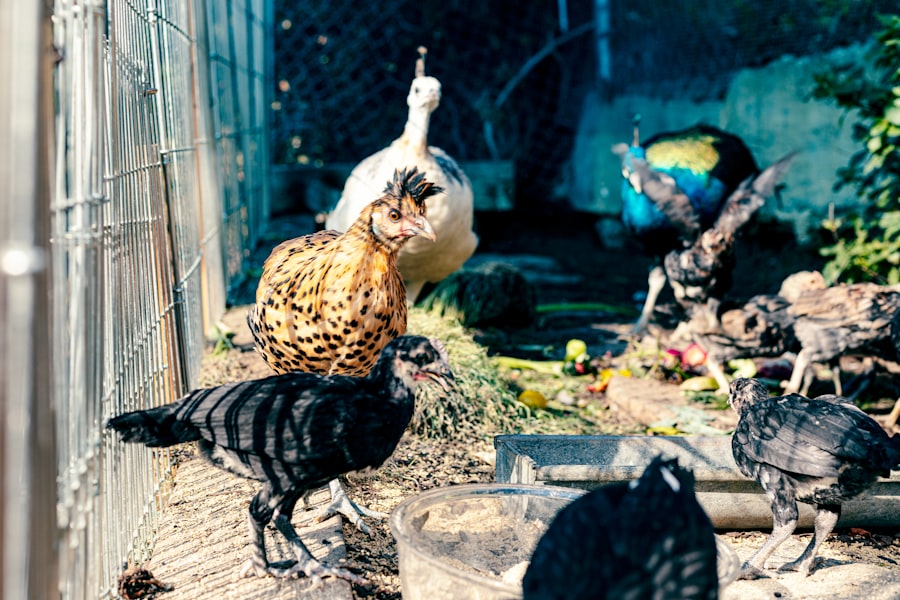
Regular veterinary check-ups are an important part of maintaining the health and well-being of your chickens. Just like any other pet or livestock animal, chickens can benefit from regular health assessments by a qualified veterinarian. A veterinarian can help identify any potential health issues early on and provide guidance on proper care and treatment.
During a check-up, the vet will examine your chickens for signs of illness or injury, check their weight and body condition, and provide any necessary vaccinations or treatments. In addition to regular check-ups, it’s important to establish a relationship with a veterinarian who has experience with poultry. This will ensure that you have access to professional advice and care when needed.
It’s also important to keep detailed records of your chickens’ health history, including any treatments or vaccinations they have received. This information can be valuable for tracking their health over time and providing important details to your veterinarian if they become ill. Regular veterinary check-ups are an essential part of maintaining the health and well-being of your chickens.
A qualified veterinarian can help identify potential health issues early on and provide guidance on proper care and treatment. By establishing a relationship with a poultry veterinarian and keeping detailed health records, you can ensure that your flock receives the best possible care.
Parasite Prevention
Parasite prevention is an important aspect of maintaining the health and well-being of your chickens. Common parasites that can affect chickens include mites, lice, fleas, ticks, and worms. These parasites can cause discomfort, stress, and illness in your flock if left untreated.
To prevent parasites, it’s important to regularly inspect your chickens for any signs of infestation, such as feather loss, irritation, or lethargy. Additionally, regularly cleaning and maintaining the coop environment can help reduce the risk of parasites taking hold. There are several methods for preventing parasites in chickens.
Regularly dusting or spraying your chickens with natural products such as diatomaceous earth or neem oil can help repel and kill parasites. Additionally, providing regular access to dust baths can help chickens naturally control parasites on their own. It’s also important to regularly deworm your chickens using veterinarian-approved products to prevent internal parasites from causing harm.
Parasite prevention is an important aspect of maintaining the health and well-being of your chickens. Regularly inspecting your flock for signs of infestation, maintaining a clean coop environment, and using natural products can help prevent parasites from affecting your chickens’ health.
Exercise and Enrichment
Exercise and enrichment are important for keeping your chickens healthy and happy. Allowing your chickens access to an outdoor run or free-ranging area can provide them with opportunities for exercise and mental stimulation. This helps prevent boredom and reduces the risk of behavioral issues such as feather pecking or aggression.
Additionally, providing enrichment activities such as perches, dust baths, and hanging treats can help keep your chickens active and engaged. In addition to physical exercise, mental stimulation is also important for chicken health. Chickens are intelligent animals that benefit from having opportunities to explore their environment and engage in natural behaviors such as scratching for food or dust bathing.
Providing environmental enrichment such as hiding treats in the coop or providing access to natural materials like branches or logs can help keep your chickens mentally stimulated. Exercise and enrichment are important for keeping your chickens healthy and happy. Providing opportunities for physical exercise and mental stimulation can help prevent boredom and behavioral issues in your flock.
By allowing access to outdoor areas and providing enrichment activities, you can help ensure that your chickens lead fulfilling lives.
Biosecurity Measures
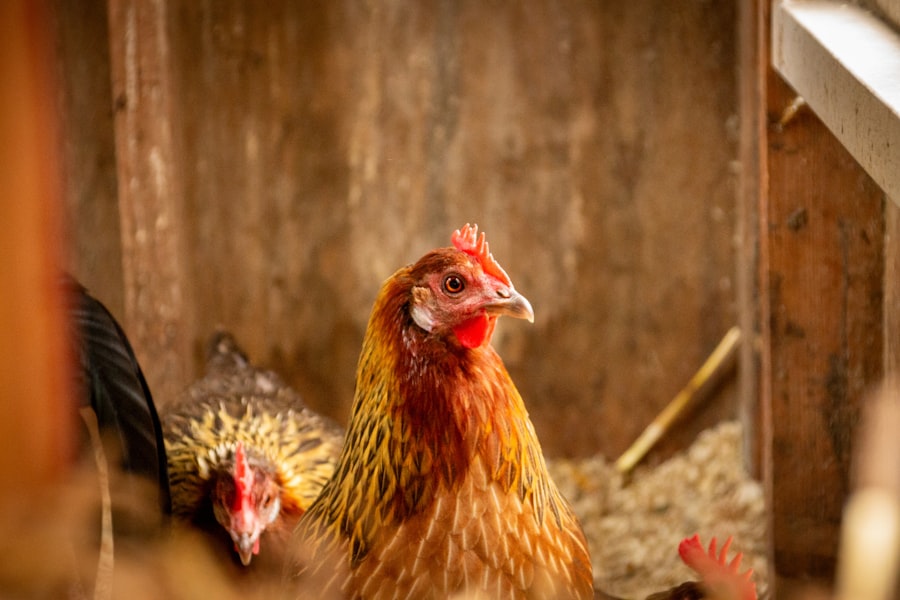
Controlling Access to Your Property
One essential biosecurity measure is controlling access to your property by limiting visitors and quarantining new birds before introducing them to your existing flock.
Cleaning and Disinfecting Equipment
Regularly cleaning and disinfecting equipment such as feeders, waterers, and tools used in the coop is vital in preventing the spread of disease. Properly disposing of manure and soiled bedding can also help reduce the risk of disease transmission within your flock.
Practicing Good Hygiene
It’s essential to practice good hygiene by washing your hands before and after handling your chickens or entering the coop area. By controlling access to your property, regularly cleaning and disinfecting equipment, and practicing good hygiene, you can help protect your flock from potential disease outbreaks.
Monitoring and Observing Behavior
Monitoring and observing the behavior of your chickens is an important aspect of maintaining their health and well-being. By regularly observing their behavior, you can quickly identify any changes that may indicate illness or stress. For example, changes in eating or drinking habits, reduced activity levels, or unusual vocalizations can be signs that something is wrong with your flock.
In addition to observing behavior, it’s important to regularly handle and examine your chickens for any signs of injury or illness. This includes checking their eyes, ears, beak, feet, feathers, and vent area for any abnormalities. By being familiar with what is normal behavior for your flock, you can quickly identify any changes that may require attention.
Monitoring and observing the behavior of your chickens is an important aspect of maintaining their health and well-being. By regularly observing their behavior and handling them for examination, you can quickly identify any changes that may indicate illness or stress in your flock. In conclusion, proper nutrition, clean coop maintenance, regular veterinary check-ups, parasite prevention, exercise and enrichment, biosecurity measures, and monitoring behavior are all essential aspects of maintaining the health and well-being of your chickens.
By implementing these practices into your chicken care routine, you can help ensure that your flock remains healthy and happy for years to come.
If you’re looking for tips on how to keep your backyard chickens healthy, you might also be interested in learning how to convert a shed into a chicken coop. This article from Poultry Wizard provides a step-by-step guide on how to repurpose a shed to create a comfortable and safe living space for your feathered friends. Check it out here.
FAQs
What are some common health issues that backyard chickens may face?
Some common health issues that backyard chickens may face include respiratory infections, parasites (such as mites and lice), egg binding, and nutritional deficiencies.
How can I prevent health issues in my backyard chickens?
To prevent health issues in your backyard chickens, it is important to provide a clean and dry living environment, offer a balanced diet, practice good biosecurity measures, and regularly monitor the health of your chickens.
What should I include in my backyard chickens’ diet to keep them healthy?
A healthy diet for backyard chickens should include a balanced commercial feed, fresh water, and access to grit and oyster shell for calcium. Additionally, offering occasional treats such as fruits and vegetables can provide added nutrition and enrichment.
How can I keep my backyard chickens’ living environment clean and safe?
To keep your backyard chickens’ living environment clean and safe, regularly clean and maintain their coop and run, provide proper ventilation, and practice good waste management. Additionally, regularly inspecting for signs of pests and predators can help ensure a safe environment for your chickens.
What are some signs that indicate my backyard chickens may be unwell?
Signs that indicate your backyard chickens may be unwell include decreased egg production, changes in behavior or posture, abnormal droppings, respiratory symptoms, and visible signs of injury or illness. It is important to monitor your chickens regularly and seek veterinary care if you notice any concerning symptoms.
Meet Walter, the feathered-friend fanatic of Florida! Nestled in the sunshine state, Walter struts through life with his feathered companions, clucking his way to happiness. With a coop that’s fancier than a five-star hotel, he’s the Don Juan of the chicken world. When he’s not teaching his hens to do the cha-cha, you’ll find him in a heated debate with his prized rooster, Sir Clucks-a-Lot. Walter’s poultry passion is no yolk; he’s the sunny-side-up guy you never knew you needed in your flock of friends!

